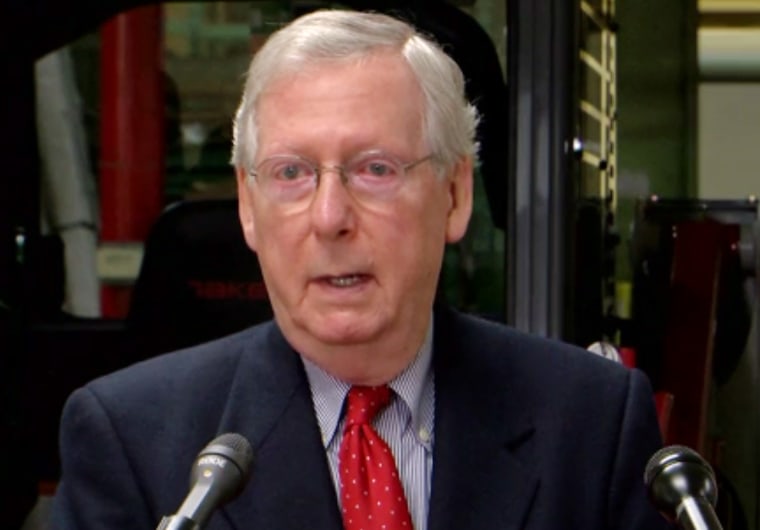First Read is your briefing from Meet the Press and the NBC Political Unit on the day's most important political stories and why they matter.
So how do you make the Republican tax efforts even more difficult? You pair it with re-starting the Obamacare Wars.
As NBC’s Benjy Sarlin writes, the Senate GOP’s tax plan now includes a repeal of the health-care law’s individual mandate — so that the legislation can meet the chamber’s reconciliation rules to pass it by a simple majority instead of 60 votes: “The Congressional Budget Office estimates repealing the mandate penalty would save $338 billion over the next 10 years, which would help Republicans pay for their $1.5 trillion tax bill. But ending the mandate would only save money because the CBO projects 13 million fewer people would have health insurance by 2027, meaning the government would spend less money subsidizing coverage through private insurance or Medicaid. Premiums on the individual insurance market would also go up 10 percent as a result.”
Repealing the individual mandate could jeopardize the votes of Sens. Susan Collins, R-Maine, and Lisa Murkowski, R-Alaska. And we’ve seen that movie before.
“Collins said it would complicate the tax bill ‘because of the effect on premiums’ -- if healthy people forgo insurance, insurers may be forced to raise their prices for policies,” Bloomberg says. “‘Are you going to have a situation where your premiums are now going to increase?” [Murkowski] said. ‘Tell me how that’s making me a happier person in the middle class here. That’s a consideration I think is very real and needs to be weighed.’”
But even if the legislation does pass (and it seems like Senate Republicans are doing whatever it takes to pass it) they won’t have an easy time selling it to the American public. Higher premiums, fewer who are insured, tax cuts for corporations, estate-tax repeal for the wealthiest of Americans – the TV ad attacks in 2018 are easy to envision.
And pairing repeal of the individual mandate makes it all but impossible to get some Senate Democrats (West Virginia’s Joe Manchin, North Dakota’s Heidi Heitkamp, Indiana’s Joe Donnelly) to support the GOP’s tax plan. And we’ve seen how partisan legislation plays with the American public at the ballot box.
Bottom line: Senate Republicans may have solved their math problem by repealing the individual mandate, but they’ve now added other problems to their tax plan – a week after health care was the most important issue in Virginia’s gubernatorial election, per the exit poll, and after Maine easily passed Medicaid expansion. What’s more, only 27 percent of Americans approve of President Trump’s handling of health care, according to last month’s NBC/WSJ poll.
Per NBC’s Alex Moe, the House tax plan — which is expected to be voted on later this week — will NOT include the individual mandate repeal, though it could be added in conference committee when the House and Senate work out their differences.
Permanent tax cuts for corporations, temporary ones for individuals
Here’s another potential problem with the Senate Republicans’ revised tax plan: “[T]hey are proposing making the new individual benefits expire at the end of 2025 in an effort to avoid adding to the long-term federal deficit,” the Los Angeles Times reports. “Proposed cuts to corporate taxes would be permanent, under the revised Senate plan.”
“Expiration of the individual tax cuts [is] likely to bolster criticism that the GOP overhauls favors corporations over middle-class Americans,” the LA Times adds.
According to September’s NBC/WSJ poll, a majority of Americans – 55 percent – said they preferred INCREASING taxes on corporations, versus 16 percent who favored DECREASING taxes for them. In other words, the individual tax cuts are more popular than the corporate ones are.
Trump has a decision to make on Roy Moore
Well, President Trump is back at the White House, and he was tweeting at 5:45 am ET: “While in the Philippines I was forced to watch @CNN, which I have not done in months, and again realized how bad, and FAKE, it is. Loser!”
But Trump now has a decision to make about embattled GOP Senate nominee Roy Moore in Alabama. Should he stay? Step down? Should there be a write-in campaign?
And it appears that Moore has lost Fox News’ Sean Hannity. “For me, [Moore] has 24 hours. You must immediately and fully come up with a satisfactory explanation for your inconsistencies that I just showed. You must remove any doubt. If he can't do this, then Judge Moore need to get out of this race.”
Speier's explosive charge
$15 million has been paid to victims of congressional harassers: On “MTP Daily” yesterday, Rep. Jackie Speier made a stunning allegation: “We do know that there is about $15 million that has been paid out by the House on behalf of harassers in the last 10 to 15 years.”
Jonathan Chait’s provocative question
Would Democrats back a child molester if their congressional majority depended on it? Liberal writer Jonathan Chait in New York Magazine: “It’s easy to feel superior about this when opposition to grotesque treatment of teenage girls lines up neatly with your own party’s well-being. If you’re a liberal, ask yourself what you would do if the circumstances were reversed. Give the other party a Senate seat and a possible majority, and forfeit your control of staffing the Cabinet, appointing judges, and passing laws you consider vital for the country’s future? Or allow one of the votes for those things to be cast by a sexual predator?”
It’s that logic that could explain how Roy Moore still wins in December.



